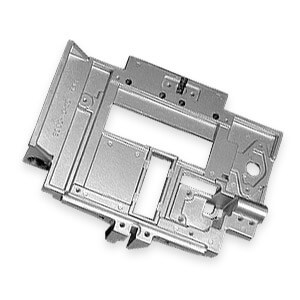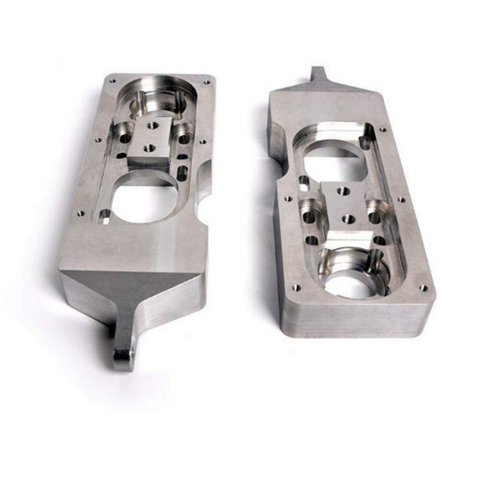How Green Practices in aluminum casting Reduce Costs and Waste
Discover the Advantages of Aluminum Casting in Modern Manufacturing
Aluminum casting has become a pivotal process in contemporary production. Its lightweight yet durable nature presents considerable advantages for various sectors. The capability to attain elaborate styles and maintain tight tolerances contributes to its appeal. Aluminum Casting Company. Furthermore, the cost-effectiveness and ecological advantages make it a sustainable option. As manufacturers look for innovative solutions, the function of aluminum casting proceeds to evolve. What certain applications and advantages await exploration in this vibrant field?
Lightweight Yet Solid: The Benefits of Aluminum
Lots of products are utilized in manufacturing, aluminum stands out due to its amazing mix of lightweight buildings and extraordinary stamina. This one-of-a-kind attribute makes aluminum a suitable selection for different applications, especially in markets such as automotive, aerospace, and construction. Its low density permits for much easier handling and transportation, adding to lowered energy usage throughout manufacturing and assembly processes.
Aluminum's strength-to-weight proportion is outstanding, making it possible for suppliers to create durable components without adding unnecessary mass. This particular is specifically valuable in markets where weight reduction can result in boosted gas efficiency and total performance. In addition, aluminum's resistance to rust improves the durability of products, better strengthening its appeal in contemporary manufacturing.
Eventually, the lightweight yet strong nature of aluminum placements it as a favored product, promoting advancement and effectiveness across multiple sectors. Suppliers increasingly recognize that these advantages can result in considerable advancements in design and capability.
Precision and Complexity in Design
As suppliers welcome the capacities of aluminum casting, they discover new avenues for precision and complexity in design. This production process allows for the production of complex forms and thorough features that traditional methods often battle to attain. The fluidness of molten aluminum allows it to fill up complicated molds, resulting in parts with tight resistances and great surface area coatings.
This precision is especially valuable in sectors such as aerospace and automobile, where exact specifications are essential for performance and safety. Aluminum casting also fits cutting-edge styles that enhance performance without compromising architectural honesty.

Cost-Effectiveness and Efficiency
Cost-effectiveness and efficiency are critical considerations for producers checking out aluminum casting as a production method. Aluminum casting deals substantial expense advantages as a result of its reduced material expenses compared to various other metals (Precision aluminum casting). The light-weight nature of aluminum minimizes delivery and handling expenses, and its excellent thermal conductivity permits quicker cooling times throughout the casting process, improving general production speed
Moreover, aluminum's versatility makes it possible for producers to produce intricate shapes and styles, minimizing the requirement for added machining or assembly. This streamlining of manufacturing not just minimizes labor expenses but also shortens lead times, permitting companies to react promptly to market needs.
In addition, the longevity and corrosion resistance of aluminum castings contribute to longer product lifespans, decreasing substitute expenses gradually. Therefore, suppliers can attain an equilibrium of high-quality result and minimized functional costs, making aluminum casting a significantly attractive choice in contemporary manufacturing.
Environmental Sustainability of Aluminum Casting
Aluminum casting stands apart as an ecologically sustainable manufacturing option, specifically because of its recyclability and reduced ecological footprint. The process permits for the reliable usage of aluminum, a material that can be reused forever without shedding its homes. This particular considerably reduces the need for try this web-site virgin aluminum, thus decreasing and preserving natural resources power intake associated with removal and handling.

Applications Across Industries: From Automotive to Aerospace
While varied sectors remain to seek ingenious products for production, aluminum casting has shown to be a functional service across sectors such as vehicle and aerospace. In the vehicle industry, aluminum spreadings add to light-weight vehicle styles, enhancing gas efficiency and performance. Elements like engine blocks, transmission housings, and wheels gain from aluminum's strength-to-weight ratio.
Likewise, in aerospace, aluminum casting plays a substantial role in generating intricate parts that call for high durability and reduced weight. Airplane components such as brackets, touchdown gear, and structural frames use aluminum for peak performance and security.
The flexibility of aluminum casting enables it to provide to various other industries, consisting of consumer electronics, aquatic, and industrial machinery. This adaptability not just meets the details demands of numerous applications but likewise supports continuous innovation in making procedures. Consequently, aluminum casting continues to be a crucial gamer in modern-day manufacturing across countless fields.
Regularly Asked Inquiries
How Does Aluminum Casting Compare to Other Steel Casting Processes?
Aluminum casting deals premium strength-to-weight proportions, faster air conditioning rates, and outstanding corrosion resistance contrasted to various other metal casting visite site procedures. These advantages make it suitable for different applications, enhancing efficiency and performance in production.
What Are the Typical Lead Times for Aluminum Casting Projects?
Regular lead times for aluminum casting tasks range from 2 to eight weeks, depending upon elements such as intricacy, order dimension, and manufacturing capability. Effective preparation can assist decrease hold-ups and improve job timelines.
Can Aluminum Casting Be Used for Intricate Designs?
Aluminum casting can indeed accommodate detailed styles. Precision aluminum casting. Its fluidness permits for comprehensive patterns and forms, making it suitable for complex components in numerous markets. This adaptability enhances layout flexibility while maintaining structural integrity and performance
What Post-Processing Options Are Offered After Aluminum Casting?
Post-processing alternatives for aluminum casting consist of machining, brightening, surface therapies, anodizing, and welding. These strategies enhance the coating, boost dimensional precision, and rise corrosion resistance, therefore enhancing the end you could try this out product's performance and aesthetic allure.
Exactly How Do Temperature Level Modifications Impact Aluminum Casting High Quality?
Temperature modifications substantially influence aluminum casting quality by affecting fluidity, solidification prices, and possible problems. Quick air conditioning can cause increased brittleness, while extreme warmth might trigger warping or insufficient dental filling of mold and mildews throughout casting.
Aluminum casting has actually emerged as a crucial process in modern manufacturing. As manufacturers embrace the capacities of aluminum casting, they find new opportunities for precision and complexity in design. Aluminum casting procedures generally generate fewer greenhouse gas exhausts contrasted to other steel casting methods. While varied sectors proceed to seek cutting-edge materials for manufacturing, aluminum casting has confirmed to be a flexible solution across markets such as automobile and aerospace. In the automobile sector, aluminum castings contribute to light-weight car layouts, boosting fuel efficiency and performance.